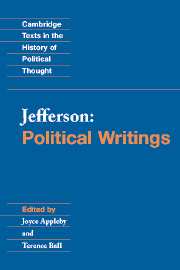Book contents
- Frontmatter
- Contents
- Preface
- Introduction
- Chronology
- Biographical synopses
- A note on sources
- Bibliographical note
- I A Private Man in Public Life
- II Natural Law, Natural Right, and Revolution
- III Self-government
- IV Moral Sense, Civic Education, and Freedom of the Press
- V The Constitutions of Virginia and France
- VI The U.S. Constitution
- VII Religious Liberty and Toleration
- VIII Political Parties
- IX Race and Slavery
- X Native Americans
- XI Women (not) in Politics
- XII Law of Nations
- XIII Innovation and Progress
- XIV Relations between Generations
- Appendices
- Index
- Cambridge Texts in the History of Political Thought
VI - The U.S. Constitution
Published online by Cambridge University Press: 05 June 2012
- Frontmatter
- Contents
- Preface
- Introduction
- Chronology
- Biographical synopses
- A note on sources
- Bibliographical note
- I A Private Man in Public Life
- II Natural Law, Natural Right, and Revolution
- III Self-government
- IV Moral Sense, Civic Education, and Freedom of the Press
- V The Constitutions of Virginia and France
- VI The U.S. Constitution
- VII Religious Liberty and Toleration
- VIII Political Parties
- IX Race and Slavery
- X Native Americans
- XI Women (not) in Politics
- XII Law of Nations
- XIII Innovation and Progress
- XIV Relations between Generations
- Appendices
- Index
- Cambridge Texts in the History of Political Thought
Summary
From the Autobiography
Our first essay in America to establish a federative government had fallen, on trial, very short of it's object. During the war of Independance, while the pressure of an external enemy hooped us together, and their enterprises kept us necessarily on the alert, the spirit of the people, excited by danger, was a supplement to the Confederation, and urged them to zealous exertions, whether claimed by that instrument, or not. But when peace and safety were restored, and every man became engaged in useful and profitable occupation, less attention was paid to the calls of Congress. The fundamental defect of the Confederation was that Congress was not authorized to act immediately on the people, & by it's own officers. Their power was only requisitory, and these requisitions were addressed to the several legislatures, to be by them carried into execution, without other coercion than the moral principle of duty. This allowed in fact a negative to every legislature, on every measure proposed by Congress; a negative so frequently exercised in practice as to benumb the action of the federal government, and to render it inefficient in it's general objects, & more especially in pecuniary and foreign concerns. The want too of a separation of the legislative, executive, & judiciary functions worked disadvantageously in practice.
- Type
- Chapter
- Information
- Jefferson: Political Writings , pp. 352 - 388Publisher: Cambridge University PressPrint publication year: 1999



